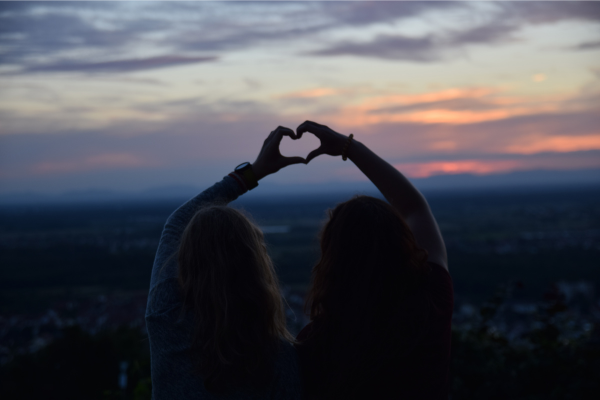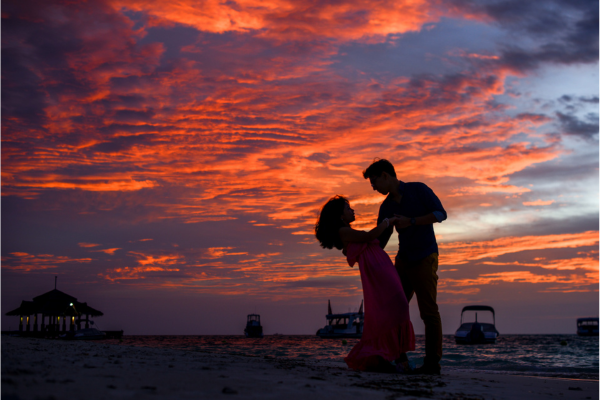Why We Have More Sex in the Summer Than Any Other Time of Year

Most animals have a mating season. They only do it at specific times of year that coincide with fertile periods. By contrast, humans are what scientists call “continuous breeders,” meaning that we’re DTF all year long. We can do it any time, any place. However, while we don’t have a limited calendar for sex, human sexual behavior still has a seasonality to it. It turns out that people consistently have more sex at certain times of year, and less at others. Specifically, what the data shows is that summertime seems to coincide with a peak in sexual activity. So what’s the deal with that? Let’s explore what the research says about sexy time in the summer.
The Science of Summer Sex
Before we get into the reasons behind why people have more sex in the summer months, let’s first look at the evidence supporting the idea that there’s a seasonal shift in sexual behavior. There are multiple pieces of data suggesting that we get hot for hot weather. For example, if you look at our online sexual behavior, research finds that we search for more porn in the summer. Searches for online dating rise at the same time, too. Likewise, looking at sales data for safer-sex tools, there has historically been an increase in condom purchases in the summer months. Considering data collected by sexual health clinics, what we see is that people report having had a larger number of sex partners when they come in for STI testing in the summer compared to other times of year. This is true for both men and women across sexual orientations. Consistent with this, clinic data also finds that the odds of being diagnosed with a sexually transmitted infection is highest in the summer. In short, all of the evidence suggests that we’re hornier and having more sex (and more partners) in the summer. To understand why this happens, though, we need to look at this through a biopsychosocial lens because there are biological, psychological, and social factors that all contribute to this.
The Role of Biology: Exposure to Sunlight Boosts Testosterone
Researchers have found that exposure to UVB light seems to prompt changes in hormones and sexual behavior in animals and humans alike. For example, in animal studies, mice that are exposed to UVB light demonstrate an increase in sex hormones. Further, both male and female mice subsequently engage in more mating behavior. Research on humans has found something similar. In a study where men and women were asked to either avoid sunlight exposure for two days vs. spend about a half hour in the sun each day, blood samples showed a rise in testosterone on the days people got more sun. Sunlight exposure therefore appears to have a direct physiological impact on the body. And since summer is the sunniest time of year, that’s when we’re going to experience the biggest effect. So part of the rise in summer sex is hormonal—we just tend to have more testosterone in our bodies, which opens the door to more feelings of sexual arousal and desire. But it’s not just about testosterone. Sunlight also boosts production of the neurotransmitter serotonin, which plays an important role in regulating mood (hence why the most popular anti-depressants are designed to target serotonin). It stands to reason that if we have more of these feel-good neurotransmitters in our system in the summer, that might also open the door to more sexual activity.
The Role of Psychology: Excitation Transfer
During the summer months, we tend to engage in more exciting and novel activities. For example, this is often the time of year when people take vacations, visit amusement parks, and engage in fun outdoor activities, like swimming. When we participate in new and exciting things like this, it has the effect of increasing our physiological arousal, which can transform into (or amplify) sexual arousal. Psychologists refer to this as “excitation transfer,” and it basically means that excitement from one situation is intensifying excitement in another situation. For example, studies have found that when people have just participated in something intense (such as exercising or riding a roller coaster), they subsequently experience an increase in sexual attraction to other people. In other words, if you do something physiologically arousing and then meet someone new, the odds of attraction rise. Beyond excitation transfer, there’s also just a broader shift in our sexual psychology in the summer due to the fact that it’s a period during which many of us have more leisure time. Taking time off from school or work can make us feel less stressed and more relaxed, which can create more opportunities for us to feel desire and arousal.

The Role of the Environment: Sexy Cues Abound
Think for a moment about how you dress differently in the summer compared to colder times of year. Odds are, you wear less clothing! Summer naturally lends itself toward a more sexualized environment. It’s a time when you’re going to see a lot of skimpy outfits, shirtless runners, and people in bathing suits. In other words, the environment around us is a very different one and we may simply be seeing more cues that trigger arousal. This effect may be amplified if you’re traveling or taking a beach vacation where you might be seeing and meeting a lot of new and attractive people. At the same time, just being in a novel environment can be a turn-on in and of itself. Maybe you’re staying in a sexy hotel room, swimming under a waterfall, or taking a late-night dip in a hot tub. Summer vacations often take us to places we associate with passion and romance, which further add to the sexy cues.
Takeaways
The data are clear: people have more sex and generally feel hornier in the summer compared to other times of year. So if you’ve ever noticed that your sexual behavior tends to be seasonal, you’re not alone! However, there’s isn’t just one simple reason behind this. A potent blend of biological, psychological, and environmental factors work together to make summer the sexiest season.
References:
Parikh, R., Sorek, E., Parikh, S., Michael, K., Bikovski, L., Tshori, S., … & Levy, C. (2021). Skin exposure to UVB light induces a skin-brain-gonad axis and sexual behavior. Cell Reports, 36(8), 109579.
Cornelisse, V. J., Chow, E. P., Chen, M. Y., Bradshaw, C. S., & Fairley, C. K. (2016). Summer heat: A cross-sectional analysis of seasonal differences in sexual behaviour and sexually transmissible diseases in Melbourne, Australia. Sexually Transmitted Infections.
Seasonal changes in Google search trends for pornography, prostitution, and online dating: Markey, P. M., & Markey, C. N. (2013). Seasonal variation in internet keyword searches: A proxy assessment of sex mating behaviors. Archives of Sexual Behavior, 42(4), 515-521.
Meston, C. M., & Frohlich, P. F. (2003). Love at first fright: Partner salience moderates roller-coaster-induced excitation transfer. Archives of Sexual Behavior, 32, 537-544.

